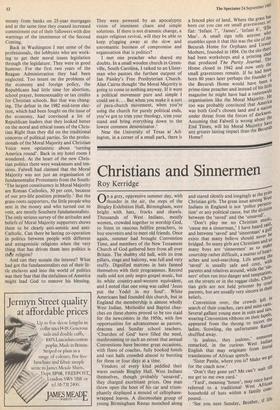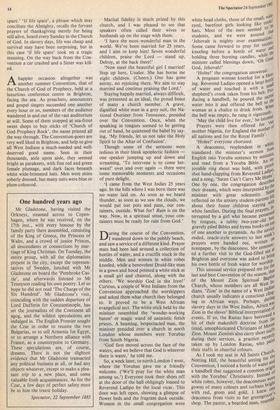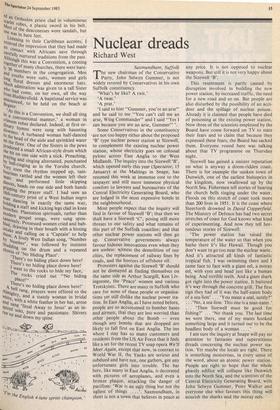Christians and Sinnermen
Roy Kerridge
(In a grey, oppressive summer day, with V thunder in the air, the steps of the Bingley Exhibition Hall, Birmingham, were bright with hats, frocks and shawls. Thousands of West Indians, mostly women, crowded together to worship God, to listen to raucous hellfire preachers, to buy souvenirs and to meet old friends. Once again, summer had brought Convention Time, and members of the New Testament Church of God gathered here from all over Britain. The shabby old hall, with its iron pillars, stage and balcony, was full and very stuffy. Dignified matrons in hats fanned themselves with their programmes. Record stalls sold not only negro gospel music, but its white country-and-western equivalent, and I noted that one song was called 'Jesus put the Yodel in my Soul'. White Americans had founded this church, but in England the membership is almost wholly West Indian. Methodist and Baptist chur- ches on these shores proved to be too staid for the newcomers in the 1950s, with few opportunities for advancement as pastors, deacons and Sunday school teachers. 'Churches of God' have filled the need, mushrooming to such an extent that annual Conventions have become great occasions, with fleets of coaches, fully booked hotels and vast halls crowded almost to bursting for three or four days at a time.
Vendors of every kind peddled their wares outside Bingley Hall. West Indians themselves, though probably 'unsaved', they charged exorbitant prices. One man threw open the boot of his car and trium- phantly displayed a mound of cellophane- wrapped loaves. A disconsolate group of young Birmingham Rastas mooched along
and stared silently and longingly at the PO Christian girls. The great issue among West Indians in England is not 'police persecu- tion' or any political cause, but the division between the 'saved' and the 'unsaved'. 'Don't play me no Christian music, 'cause me a sinnerman,' I have heard said' and between 'saved' and `sinnerman' a gulf exists that many believe should never be bridged. So many girls are Christians and many boys are 'sinnermen' as to make courtship rather difficult, a matter of heart- aches and soul-searching. Life among tht! `saved' is usually safe and cosy, with npearrsenotsftaenndrurenlaitnivtoesdaarnoguenr da,nwd hteilme pt hoe 'sin n: on the streets or in the reggae clubs. Chris- tian girls are not held prisoner by cruel beliefs.
n' parents, but are usually very sincere in their
Convention over, the crowds left in search of their coaches, cars and mini-vans. Several gallant young men in suits and ties, wearing Convention ribbons on their lapels' appeared from the throng to escort the ladies. Scowling, the unfortunate Rastas shuffled away.
nl 'Is jealous, they jealous,' so remarked, in the curious West India English that may originate from literal
il,
eone translations of African speech.
'Sister Pestle, where you is? Make we 0
for the coach now.' i `Don't they gone yet? Me can't wait 'Yard', meaning 'house', may oncehatvilel me get to me own yard.'
referred to a traditional West African household of huts within a family com- pound.
'See you next Sunday, Brother, if life spare.' If life spare', a phrase which may conciliate the Almighty, recalls the fervant prayers of thanksgiving merely for being still alive, heard every Sunday in the Church of God. In slavery days, life was cheap and survival may have been surprising, but in this case `if life spare' took on a tragic meaning. On the way back from the Con- vention a car crashed and a Sister was kill- ed.
Ahappier occasion altogether was another summer Convention, that of the Church of God of Prophecy, held at a luxurious conference centre in Brighton, facing the sea. As preachers, announcers and gospel singers succeeded one another every hour or so, members of the audience wandered in and out of the vast auditorium at will. Some of them stopped at sea-front sweet shops to buy sticks of 'Church of God Prophecy Rock', the name printed all the way through. The Convention-goers are very well liked in Brighton, and help to give all West Indians a much-needed and well- deserved good name. Seen in their thousands, aisle upon aisle, they seemed bright as parakeets, with fine red and green female plumage, and dark faces beneath white wide-brimmed hats. Men were more soberly dressed, but many suits were blue or plum-coloured.
Marital fidelity is much prized by this church, and I was pleased to see that speakers often called their wives or husbands up on the stage with them.
'I have the most wonderful man in the world. We've been married for 25 years, and I aim to keep him! Seven wonderful children, praise the Lord — stand up, Delroy, at the back there!'
`Now meet the beautiful girl I married! Step up here, Unalee. She has borne me eight children. (Cheers.) One has gone astray, no rejoicing there. We aim to stay married and continue praising the Lord.'
Staying happily married, always difficult, was presented as an ideal, the proud boast of many a church member. A grave, dignified white man in a grey suit, the Na- tional Overseer from Tennessee, presided over the Convention. Once, when the speaking in tongues seemed to be getting out of hand, he quietened the babel by say- ing, 'My friends, let us not take the Holy Spirit to the Altar of Confusion'.
Though some of the sermons were tedious in their bleak apoplectic fashion one speaker jumping up and down and screaming, `To intervene is to come bet- ween!' over and over again — there were some memorable moments and occasions of pure delight.
'I came from the West Indies 25 years ago. In the hills where I was born there was no water laid on. As soon as we heard thunder, as soon as we saw the clouds, we would put our pots and pans, our con- tainers, outside. What for? Rain is on the way. Now, in a spiritual sense, your con- tainers must be ready for rain from God.'
During the course of the Convention, I wandered down to the pebbly beach, and saw a service of a different kind. Prayer mats had been laid around a collection of bottles of water, and a crucifix stuck in the middle. Men and women in white robes kneeled, while a benevolent Druid-like man in a gown and hood pointed a white stick at a small girl and chanted, along with the others, 'We worship God in the Iron!' Curious, a couple of West Indians from the Convention approached the worshippers and asked them what church they belonged to. It proved to be a West African evangelical sect. The white stick held by the minister resembled the 'wonder-working baton' or magic wand of animistic fetish priests. A beaming, bespectacled man, the minister presided over a church in north London whose members were Yorubas from South Nigeria.
`God first moved across the face of the waters, and we believe that God is wherever there is water,' he told me.
So, a week later, to north London I went, where the Yorubas gave me a friendly welcome. ('We'll pray for the white man among us.') Everyone took their shoes off at the door of the hall obligingly loaned to Reverend Ladipo by the local vicar. This door was left open, showing a glimpse of flower beds and the fragrant dusk outside. Women in the small congregation wore
white head cloths, those of the small, wide: eyed, barefoot girls looking like coekbse hats. Most of the men seemed In students, and we were assured tna, 'Jehovah is mighty over examinations Some came forward to pray for success,' kneeling before a bottle of water and holding three burning candles, while minister called blessings down, 'Oh Grea God, Jehovah!'
`Holee!' the congregation answered. A pregnant woman kneeled for a WI ing. Reverend Ladipo opened a large boa!!of water and touched it with a stn
shepherd's crook taken from his belt. Pr:i ducing a handbell, he poured the sac'', water into it and offered the bell to tnicl woman as a chalice to drink from. When the bell was empty, he rang it vigorousLY,', 'May the child live for ever,' he intnneur Prayers were then offered for °11, mother Nigeria, for England the mother 0' all nations and for the Royal FamilY'.
'Holee!' everyone chorused.
A deaconess, resplendent in white translated the minister's sermon fecl" English into Yoruba sentence by sentence' and read from a Yoruba Bible. A0 ell' joyable ring shout was held, with PiSt°,; shot hand-clapping from Reverend LadIP',' and a song, 'Satan Can't Carry Me H°11/eci One by one, the congregation describe4 their dreams, which were interpreted bY tne minister with great solemnity. SII„it reflected on the anxiety student-parents about their foster children staying With white families. During the final prayers, jei'd terrupted by a girl who became possess v by tongues, a tubby two-year-old b,ncl'a gravely piled Bibles and hymn books on '"`e of one another in pyramids. As the servi;c,s ended, oracle-style answers to last week prayers were handed out, written notepaper, by the deaconess. She annonlic at ed a further visit to the God-filled seaL Brighton and everyone was asked to hr. his own bottle of fresh water for worshT, This unusual service prepared me for t last and best Convention of the season, test of the Mount Zion Spiritual Ba Church, whose members are all West,,;„,,-- dians. 'Zion' in the name of a West Indian church usually indicates a conscious cling' ing to African ways. Perhaps, during slavery days in the West Indies, Africa vl Zion in the slaves' Biblical interpretation 00 events. If so, the Rastas have borroWeeL bit of their makeshift doctrine from t",it timid, unsophisticated Christians of MOurfs Zion. Mount Zionists also carry short stn during their services, a practice recenit't taken up by London Rastas, who 1/8n– their staffs in cheerful colours. As I took my seat in All Saints Church,Notting Hill, the beautiful setting for I'hd Convention, I noticed a bottle of water 911 a handbell that suggested a common (right with the Yorubas' Christianity. Instead ° white robes, however, the deaconesses wort ,t gowns of many colours and turbans briPc with red, green and gold. I knew °11. deaconess from visits to her greengrocer? shop. The pastor, a bearded man, rese1111/1- sed an Orthodox priest clad in voluminous k.earlet robes, a plastic sword in his belt. 1°st of the deaconesses wore sandals, but one Was in bare feet.
Listening to their Caribbean accents, I received the impression that they had made
no contact with Africans save through carefully nurtured traditions from the past. -ougoh this was a Convention, a coming ltk•gether 1,, of many churches, there were bare-
iY members in the congregation. Men
"1 ad Youths wore suits, women and girls k„cang floral dresses and enormous hats. '"aeh admiration was given to a tall Sister wr ° had come, on her own, all the way from Huddersfield. A baptismal service was "so ,,anou gnor,nced, to be held on the beach at in As this is a Convention, we shall all sing n a conventional manner,' a woman in dcjirnson robes declared. Indeed, at first or- 0arY hymns were sung with haunting ,wness. A turbaned woman half-danced Lo the , head of the aisle and sprinkled water on the floor. One of the Sisters in the pews produced a small African-style drum which she hit on one side with a stick. Preaching, braying and singing alternated, punctuated V°ell-ringing as in the Yoruba church. erY soon the rhythm stepped up, tam- "%Fines rattled and the women left their
dseats and u performed little skipping
Rainces, heads on one side and both hands iei,Ping the prayer staff. I had seen an
„.'"eentury print of a West Indian negro
dancing in exactly the same way, °Icling a staff and kicking legs clad in than
to Plantation spirituals, rather than
ta°,,clern gospel songs, were sung spon- ble°nsly. Possessed women cried and bab- hred, drawing in their breath with a hissing thIalte and calling on a 'Captain' to help b"ent. A lively West Indian song, 'Number thud N,411: rnber), was followed by insistent thud on the drum and a repeated chorus of `No Hiding Place'. 'There's no hiding place down here! There's no hiding place down here! I went to the rocks to hide my face, The rocks cried out "No hiding
Place!"
There's no hiding place down here!' Almighty, and a stately woman in bridal With a white feather in her hat, arose s„. sang `Steal Away to Jesus' as an in- ran .1) red
„ vto pure and passionate. Shivers and down my spine.
I n1 the English 4-lane sprint champion.'








































 Previous page
Previous page